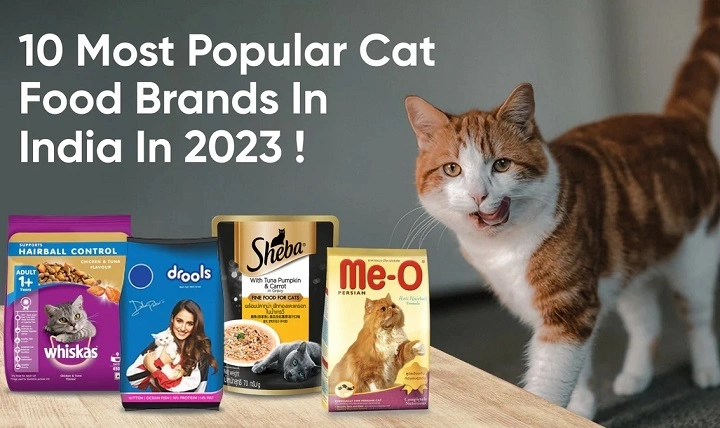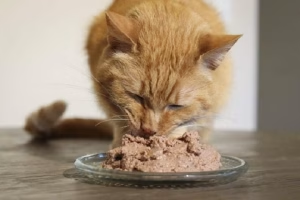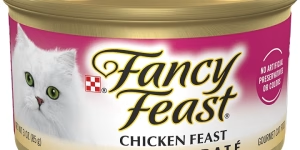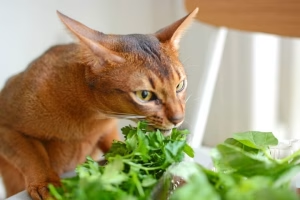If your cat has a sensitive stomach, it can be challenging to find the right food that promotes their overall health without triggering digestive issues. Wet cat food for sensitive stomachs can be a life-saver in such cases, offering nourishment that’s gentle on your pet’s digestive system while providing essential nutrients. In this article, we’ll explore some of the best options, ingredients to look for, and tips to help you choose the right food for your feline friend.
Understanding Sensitive Stomachs in Cats
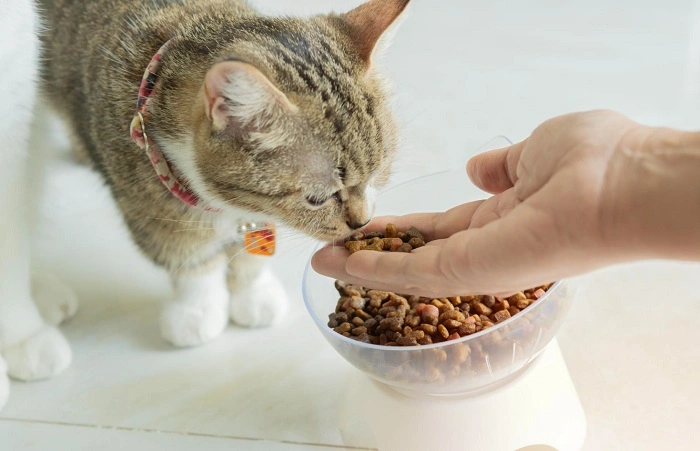
What Causes Sensitive Stomachs in Cats?
A cat’s sensitive stomach can result from various factors, including food allergies, digestive issues, or even stress. When cats eat food that doesn’t agree with them, they may experience symptoms like vomiting, diarrhea, or bloating. These symptoms often occur because their stomachs are unable to process certain ingredients properly.
In such cases, it’s important to switch to a diet that provides the right balance of ingredients and is easy for your cat to digest. Wet cat food for sensitive stomachs is formulated to offer precisely that, providing gentle yet complete nutrition.
Signs Your Cat May Have a Sensitive Stomach
It’s essential to recognize the signs of a sensitive stomach in your cat. Some common symptoms include:
- Vomiting after meals
- Diarrhea or loose stools
- Loss of appetite
- Excessive gas or bloating
- Licking or biting at their stomach area
If your cat exhibits any of these symptoms regularly, it’s time to consider wet cat food for sensitive stomachs. It’s also advisable to consult with your vet to rule out any underlying health conditions.
What to Look for in Wet Cat Food for Sensitive Stomach
When choosing wet cat food for sensitive stomachs, it’s crucial to consider the ingredients and formulation. Here are some key factors to keep in mind:
High-Quality Protein
Protein is an essential part of your cat’s diet. However, cats with sensitive stomachs may struggle with certain types of protein. Look for wet cat food that uses easily digestible protein sources, such as turkey, chicken, or salmon. These are typically gentler on the stomach compared to beef or pork.
Limited Ingredient Diets
Wet cat food that offers a limited ingredient diet (LID) can be an excellent choice for sensitive stomachs. These formulas usually feature fewer ingredients, which can help identify and avoid potential allergens that might cause digestive upset. LID foods often focus on one primary protein source and a small number of other ingredients.
Grain-Free Formulas
Grains such as corn, wheat, and soy can be hard on a sensitive stomach and may trigger food allergies in some cats. Many wet cat foods formulated for sensitive stomachs are grain-free, substituting grains with healthier, more digestible carbohydrates like sweet potatoes or peas.
Probiotics and Prebiotics
Probiotics are beneficial bacteria that help support healthy digestion by balancing the gut microbiome. Some wet cat foods contain probiotics to promote digestive health. Prebiotics, which are non-digestible fibers, can also be included to support good gut bacteria. These ingredients can help soothe your cat’s stomach and reduce symptoms of digestive distress.
Avoid Artificial Additives
Cats with sensitive stomachs are particularly susceptible to the negative effects of artificial additives, including colors, flavors, and preservatives. Opt for wet cat food free of artificial chemicals to avoid upsetting your cat’s stomach.
Best Wet Cat Foods for Sensitive Stomachs
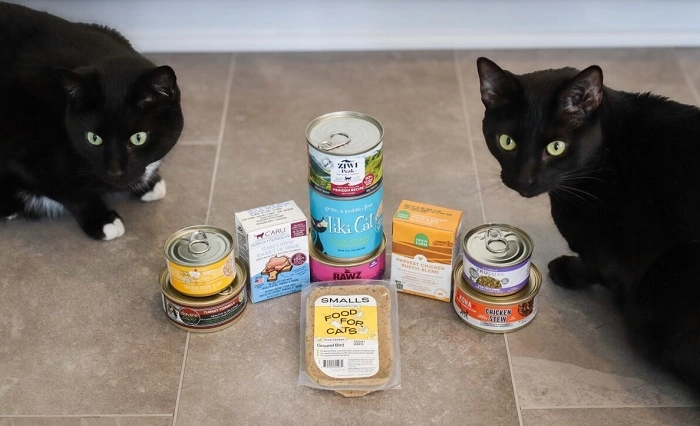
Here are some of the best wet cat food options available for cats with sensitive stomachs:
1. Hill’s Science Diet Adult Sensitive Stomach & Skin Chicken Recipe
This formula is designed specifically for cats with sensitive stomachs. It features easily digestible chicken protein and a blend of prebiotic fiber to promote digestive health. Hill’s Science Diet is a trusted brand in veterinary care and is free from artificial flavors and preservatives, making it an excellent choice for sensitive cats.
2. Blue Buffalo Basics Limited Ingredient Diet
Blue Buffalo Basics offers a limited ingredient diet that’s perfect for cats with food sensitivities. This recipe contains turkey as the primary protein source, along with pumpkin and easily digestible carbohydrates. The food is free from grains, gluten, and dairy, making it a great option for cats with food allergies or sensitivities.
3. Wellness CORE Grain-Free Turkey & Duck
Wellness CORE offers a high-protein, grain-free formula designed for cats with sensitive stomachs. It features turkey and duck as the primary protein sources, along with added fiber to support digestion. This recipe is also enriched with probiotics, which can help maintain gut health and reduce digestive issues.
4. Natural Balance L.I.D. Limited Ingredient Diets
Natural Balance’s Limited Ingredient Diets are formulated with a single animal protein source, making them ideal for cats with food sensitivities. The turkey formula is particularly popular, offering easily digestible protein and a simple ingredient list. This food also contains pumpkin for additional fiber and digestive support.
5. Royal Canin Feline Health Nutrition Digest Sensitive
Royal Canin’s Digest Sensitive formula is tailored for cats with sensitive stomachs. It contains highly digestible proteins, along with a blend of fibers that support optimal digestion. The formula is designed to reduce the risk of digestive upset, making it a great option for cats with food sensitivities.
How to Transition to Wet Cat Food for Sensitive Stomach
Switching your cat to a new food, especially one designed for sensitive stomachs, should be done gradually. A sudden change in diet can upset your cat’s stomach and worsen digestive problems. Here’s how to transition your cat to wet food:
- Start Slowly: Begin by mixing a small amount of the new food with your cat’s current food. Gradually increase the proportion of the new food over the course of 7-10 days.
- Observe for Symptoms: Monitor your cat for any signs of digestive upset, such as vomiting or diarrhea. If you notice any issues, slow down the transition process.
- Stick with One Brand: Try to stick with one brand and flavor initially to avoid overwhelming your cat’s digestive system.
The Importance of Consulting a Veterinarian
While wet cat food for sensitive stomachs can help alleviate digestive issues, it’s important to consult with your vet before making any changes to your cat’s diet. Your vet can help identify the root cause of your cat’s sensitive stomach and recommend the best food options based on their specific health needs.
FAQs
What causes a cat to have a sensitive stomach?
Sensitive stomachs in cats can be caused by food allergies, intolerances, stress, or gastrointestinal diseases. It’s essential to identify the cause for proper treatment.
How can I tell if my cat has a sensitive stomach?
Symptoms of a sensitive stomach in cats include vomiting, diarrhea, bloating, and loss of appetite. If your cat frequently exhibits these symptoms, it may have a sensitive stomach.
Can wet food help a cat with a sensitive stomach?
Yes, wet food is often easier to digest than dry food, making it a good choice for cats with sensitive stomachs. Look for foods with easily digestible proteins and minimal ingredients.
What is the best protein for cats with sensitive stomachs?
Turkey, chicken, and salmon are excellent protein sources for cats with sensitive stomachs. These proteins are gentle on the digestive system and less likely to cause irritation.
Can probiotics help with my cat’s sensitive stomach?
Yes, probiotics can promote digestive health and help balance the gut microbiome, which can improve digestion and reduce symptoms like vomiting and diarrhea.

